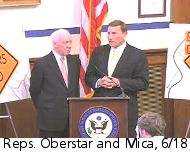6/22/2009
US House Wants More Transit Spending, Fewer TollsCongress takes first step in reshaping federal transportation programs to limit tolling and increase diversion of gas tax funds to transit.

On Thursday the bipartisan leadership of the US House Transportation and Infrastructure Committee introduced its $500 billion blueprint for federal transportation programs over the next six years. In addition to creating new rail and transit subsidies, the proposal introduces new roadblocks for state looking to convert existing free roads into toll roads.
Committee Chairman James L. Oberstar (D-Minnesota) and Ranking Member John L. Mica (R-Florida) agreed that legislative consideration of the proposal should move forward this Wednesday. Oberstar's proposal represents a 53 percent increase in spending over the previous authorization level and will require significant increases in revenue generated. Oberstar lashed out at a suggestion from Transportation Secretary Ray LaHood that Congress should hold off on action so that the expected vote on raising gas taxes would be delayed until after the midterm congressional elections.
"We don't have time [to wait] for eighteen months," Oberstar said. "That puts a Damocles sword of uncertainty over the future of transportation. It is unacceptable. We are open to negotiation with the White House, but they have too come across the divide and talk with us. We are a separate, distinct and independent body of government coequal with the executive branch and expect to have a partnership in shaping the future of transportation."
The proposal consolidates or terminates 75 federal programs into a series of new offices that determine how federal gas tax receipts will be spent. Many of the new offices are designed to meet Obama Administration non-highway priorities, including an office that will redesign streets to cater to the needs of non-motorists. New priorities such a bus lanes will be mandated through the use of "greenhouse gas reduction" quotas.
"The Office of Livability will establish a focal point within the Federal Highway Administration to advance environmentally sustainable modes of transportation, including transit, walking, and bicycling," the plan's executive summary explained. "This office will encourage integrated planning, linking land use and transportation planning, to support the creation of livable communities.... The Environmental Protection Agency, in consultation with DOT, will establish national transportation-related greenhouse gas emissions reduction goals."
The tolling industry is already gearing up for battle after the blueprint proposed to repeal the laws currently used to impose tolls on federal aid highways. These include the Interstate System Construction Toll Pilot programs, the Road User Fees Field Test, Value Pricing Pilot program and the Public-Private Partnership pilot program. The blueprint, however, does not end tolling. Instead, it creates the Office of Public Benefit to restrain its use to narrowly defined circumstances.
"To protect the integrity of the nation's surface transportation system and the public interest regarding trade and travel, the federal surface transportation program requires strengthened public protections regarding highway toll projects and PPP agreements," the proposal stated.
The blueprint explained how it would end a number of common tolling practices. Money collected from motorists could not be used to supplement spending on projects outside the toll road, other than nearby road and transit projects. Private companies would not be allowed to prevent improvements on nearby free roads through "non-compete" contract agreements with state transportation officials. Details about tolling proposals would have to be made available to the public before being finalized. A report would have to be made on the effect of traffic diversion on nearby streets and subsidies for "low-income travelers" would have to be implemented.
A copy of the blueprint is available in a 500k PDF file at the source link below.


